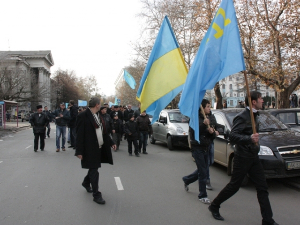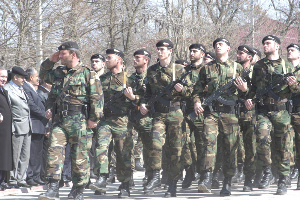Moscow and the Crimean Tatars: is Russia Inciting a New Jihadi Front?
By Stephen Blank (08/05/2014 issue of the CACI Analyst)
When Moscow invaded and annexed Crimea, it also reacquired control over the Crimean Tatar population there, approximately 300,000 people. Russia’s annexation is utterly at odds with the desires of the Crimean Tatars and their Majlis or Council. As the veteran Tatar leader Mustafa Dzhemilev has said, they want only autonomy within Ukraine, an insight based on the clear recognition that only in a democratic Ukraine, especially in the light of planned reforms to decentralize Ukraine’s administration, can their demands be met. The record of the treatment of Tatars in Crimea after Russia’s annexation implies that Moscow risks inciting a new insurgency, possibly with Jihadist overtones.

Ukraine and the Northern Distribution Network
By John Daly (08/05/2014 issue of the CACI Analyst)
Two routes of the Northern Distribution Network (NDN), collectively known as the Northern Lines of Communication (NLOC) run through Russia, but deteriorating U.S.-Russian relations over Ukraine could complicate the continued usage of the NDN by U.S./NATO/ISAF forces. The NDN’s importance is well understood in both Washington and Moscow. The question is now, in an attempt to modify Russian behavior over Ukraine, whether a proposed third round of increased Western sanctions and intensified NATO activities around Russia’s periphery may cause the Russian government to deny ISAF and NATO further use of the NLOC segments of the NDN.
Azerbaijan Struggles to Remain Unaligned in Wake of Ukraine Crisis
By Mina Muradova (07/02/2014 issue of the CACI Analyst)
The ongoing crisis in Ukraine has pushed several post-Soviet countries to decide whether they are primarily oriented toward the West or Russia. On June 27, Azerbaijan’s neighbor Georgia, along with Ukraine and Moldova, signed landmark partnership agreements with the European Union, which establish closer economic ties between these economically weak states and the EU. They obligate the countries to observe EU regulations governing customs, exports, and economic competition, and will allow them access to European markets.
At the same time, Azerbaijan’s other neighbor, Armenia, has committed to joining the Russia-dominated Eurasian Economic Union (EEU). Russia, Kazakhstan and Belarus signed an agreement on the establishment of the EEU in Astana on May 29. The summit was also attended by Armenian President Serzh Sargsyan, who nevertheless did not sign the agreement but asked for additional time.
Yet Baku has stuck to a pragmatic approach and has publicly rejected the Kremlin’s invitation to join the EEU, while being in no apparent hurry to enter any other agreement. Azerbaijan’s broader foreign policy of regional balance, favoring Euro-Atlantic integration while at the same time seeking to maintain good relations with Russia, allow Baku to reap benefits from all possible partnerships.
In June 2014, Russian ministers and high-level officials visited Azerbaijan to persuade Baku to enter closer cooperation with Moscow. Russia’s Economy Minister Alexei Ulyukayev visited Baku in early June to discuss economic cooperation and invite Azerbaijan to join the EEU. Russia’s Foreign Minister Sergei Lavrov then arrived on June 18-19 for a continuation of what he described as “a most active dialogue.” In addition, Azerbaijan hosted visits by Russia’s Deputy Prime Minister Dmitry Rogozin, Duma Speaker Sergei Naryshkin, and Development Minister Igor Slyunayev.
“Azerbaijan is our strategic partner … Our cooperation is being actively developed not only in a two-side format, but also in multi-side directions, including issues of stability and security in the Southern Caucasus and Caspian region,” Lavrov said at a news conference in Baku on June 18. The two sides discussed the situation in Ukraine, and Lavrov said that Azerbaijan has not been formally invited to join either the Customs Union or the EEU, but added that Moscow would welcome any partner interested in collaboration with those organizations.
Baku has indicated that it has no plans to join those blocs. “Azerbaijan yet has no intentions and doesn’t think about joining the Eurasian Union,” the Deputy Head (and Director of the Foreign Relations Department) of Azerbaijan’s Presidential Administration, Novruz Mammadov, told reporters on June 11.
According to Lavrov, the frozen conflict in Nagorno-Karabakh will not affect the Eurasian integration processes: “it is a subject of other international negotiations.” Kazakhstan’s President Nursultan Nazarbayev previously remarked that “the treaty with Yerevan must have a special provision about Armenia’s internationally recognized borders that do not encompass Nagorno-Karabakh.”
Commenting on Armenia’s accession to the Eurasian Union, Mammadov stressed that Azerbaijan has no reason to express any concern on this issue. Referring to an appeal from Baku to the presidents of Russia, Kazakhstan and Belorussia, that Armenia can join any organization under the same conditions as outlined in the treaty with the World Trade Organization, meaning within its internationally-recognized borders, Mammadov stressed that “this is our demand and it will be fulfilled.” Yet it is still unclear how this will be controlled.
Armenia’s ruling party insists that Karabakh will not join the EEU de jure, but Gagik Minasyan, the head of the committee on financial and budgetary affairs at the Armenian parliament, said that Armenia’s membership in the EEU will open new economic opportunities for Nagorno-Karabakh. Minasyan stressed that “Armenia and Nagorno-Karabakh are a single economic area and there can be no customs point between them.”
It appears that Azerbaijan’s refusal to join the EEU will not prevent continued arms sales from Russia. Dmitry Rogozin, who is overseeing the Russian defense industry and heading the Azerbaijan-Russia intergovernmental commission for cooperation also visited Baku in June.
According to the Atlas Analytical Research Centre, “The arms deals are beneficial for both Moscow and Baku. Moscow will get more money from arms sales and will keep Azerbaijan as a traditional market for Russian arms, while Baku will keep a strategic partnership on a high level and insure itself from serious problems with its Northern neighbor.” According to Atlas, Russian weapons sales makes up 80 percent of all Azerbaijan’s arms deals, which totaled about US$ 4 billion in the last four years and has included the transfer of many advanced systems to Azerbaijan.
In addition, Azerbaijan is willing to enhance its economic and humanitarian cooperation with Russia. Eleven commercial agreements were signed at a big Azerbaijan-Russia economic forum held in Gabala, with the participation of over 200 representatives from 25 regions of the Russian Federation. The sides discussed the expansion of transit traffic for all types of transport and agreed to ease border crossing procedures, particularly for automobile traffic.
Andrey Kazantsev, Director of the Analytical Center at the Moscow State Institute of International Relations, noted that the visits of Moscow’s emissaries to Baku constitute an attempt to maintain Russia’s sphere of influence in post-Soviet countries: “the competition for influence in post-Soviet countries has increased. While some of them have already determined who they are going to be with, there are still countries which continue to keep multi-direction policies and here either Russia or the West increases their efforts to attract them.”
According to Kazantsev, the U.S. is seeking to isolate Russia diplomatically due to its position on the Ukrainian crisis, and Russia is in turn trying to counteract these moves through the post-Soviet countries. Another key reason for Moscow’s activities is to brief Baku regarding Armenia’s accession to the EEU to avoid harming its strategic partnership with Azerbaijan, which is justified by arms sales and other economic agreements.
Chechen Units Deployed in Eastern Ukraine
By Emil Souleimanov (06/04/2014 issue of the CACI Analyst)
News has recently spread of the involvement of Chechens in the Ukraine crisis. According to numerous eyewitnesses, members of Chechen elite units, commonly known as kadyrovtsy, were spotted in the eastern Ukrainian city of Donetsk where they were reportedly deployed in combat against local Ukrainian troops. Soon, sources in Chechnya started informing of dozens of corpses of Chechens being transported from Ukraine back to this North Caucasian republic. The participation of the kadyrovtsy units in military operations outside the North Caucasus indicates a novel trend that could have broad security implications transcending the region’s borders.






